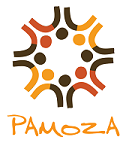Behind the Scenes
Meet Samson Phiri
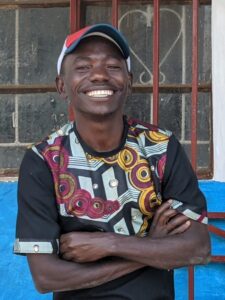 Samson is a sales clerk at Pamoza’s Agri-Depot in Zowe. He is passionate about community development and helping people become more self sufficient and independent. He loves planning, human resource management and working in teams. We caught up with Samson and this is what he had to say about Pamoza International.
Samson is a sales clerk at Pamoza’s Agri-Depot in Zowe. He is passionate about community development and helping people become more self sufficient and independent. He loves planning, human resource management and working in teams. We caught up with Samson and this is what he had to say about Pamoza International.
Tell about yourself, your family background and your interests.
I was born in Malawi and I have three siblings. We were raised in a Christian household where my parents encouraged us to go to church and to pray. My youngest brother and I both hold college degrees, while my older brother and young sister have high school certificates. My father, who is deceased, was a teacher and my mother a homemaker. I am happily married to my wife Agness, and we have a son, Lovemore.
I am very interested in economics and my desire is to one day become an economist. I am also interested in graphic design, soccer (or football as we call it), learning new things and reading books that include the bible.
How did you get connected to Pamoza and how are you currently involved?
I get connected to Pamoza through my wife’s sister. She helped shed more light on the work that Pamoza does in Malawi. I also learned more from visiting the Pamoza website.
Currently, I am a Sales Clerk at Zowe Agri-Depot. Our Agri-Depot shop is part of Pamoza’s economic empowerment initiative where we sell agri-inputs such as fertilizer, seeds, chemicals etc. We also purchase and sell maize (corn) as part of the Joseph food banks initiative. I also participate in different trainings within the Pamoza community.
What keeps you engaged and what makes you smile the most?
There are many things that keep me engaged all the time. I am particularly drawn to Pamoza’s vision because it is in line with my personal passions and goals. I am very passionate about community development and supporting people to be self sufficient and independent. Secondly, working with Pamoza makes me proud and happy because I am among people who contribute to the development of my community. In addition, working with Pamoza it gives me a platform to share the love of God and spiritual growth through learning (training) and weekly fellowship. Last but not least, I also have hope that I will grow my career and be considered for other job opportunities that are available at Pamoza.
What impact has your Christian faith had in your life?
My Faith in Christ has greatly impacted me and many others whom I Interact with. I am who I am today because of Jesus Christ my Lord. Faith in Christ has helped me understand and know the purpose and meaning of life. I try to live a purposeful life, I know where I am going and I know what I live for. My career, education, family and vision are all for the glory of God my savior. The bible says in Ephesians 6 v 7, “We do good will as doing service, to the Lord, and not to men.” Now I don’t do anything as to men, but as to the Lord my God, who will reward me in due time.
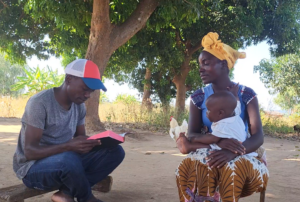
I have managed to minister the word of God (gospel) to hundreds of people. From 2019 to 2022 I was organizing open air preaching in hospitals, market places, and various places in Blantyre city and Mzimba. I thank God for His grace. I thank God that I have a beautiful wife and He has blessed us with a son, Lovemore Phiri.
What is the greatest need you see in the communities that Pamoza serves and what do you think is the best solution?
There are several crucial needs in the communities that Pamoza serves. I will highlight three that come to mind. First is education. I understand that Pamoza supports many children with school fees but I think it is important to start to address the issue at a grassroots level. I think that Pamoza should introduce a nursery school (kindergarten) that will help establish a foundation for education. This will lead many children doing well at primary school and reduce school drop out rates since children will be introduced to school at a very early age.
The second is a financial need. I highly recommend that Pamoza start giving soft loans to women entrepreneurs most of whom support their families. This will help them economically and allow them to be independent, self sufficient and have more time to focus on their families.
Thirdly is a spiritual need. Pamoza, in addition to the work the organization is already doing, should work with different church leaders to spread the gospel — a deliberate decision to support all interested people who are willing to preach. The bible says that we should not get weary of doing the work of God.
What is one thing most people don’t know about you?
 Many people don’t know that I am a song writer and singer. Much of my free time is spent writing songs (mostly gospel songs). I haven’t composed any songs yet, but I will once I find resources. Many people also don’t know that I am an open air preacher. When I was in college, I spent almost each weekend preaching in market places, hospital shelters, and the streets. I was inspired by American street preacher, David Wilkerson.
Many people don’t know that I am a song writer and singer. Much of my free time is spent writing songs (mostly gospel songs). I haven’t composed any songs yet, but I will once I find resources. Many people also don’t know that I am an open air preacher. When I was in college, I spent almost each weekend preaching in market places, hospital shelters, and the streets. I was inspired by American street preacher, David Wilkerson.
What is something interesting about Malawi?
Malawi is one of safest countries to visit in Africa. Malawian people are friendly, kind and lovely. The country is comprised of many different ethnic groups, contributing to its rich culture. One of Malawi’s great attractions is its diverse natural landscapes and wildlife. The Rift Valley floor stretches through the length of the country!
How can we pray for you?
– Pray for me that God should bless me and my work (for a promotion), my business and all my hustles so that I should be financially stable.
– Pray for my family, my wife Agnes and my son Lovemore, for Godly wisdom and protection
– And anything else that the Spirit of God may quicken you to pray for.
Thank you!
Meet Jennifer Gard
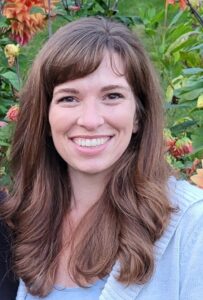 Jennifer is a Pamoza partner. She is passionate about public health, primarily in Africa. We caught up with Jen and here is what she had to say about Pamoza International.
Jennifer is a Pamoza partner. She is passionate about public health, primarily in Africa. We caught up with Jen and here is what she had to say about Pamoza International.
How did you get connected to Pamoza?
I got connected to Pamoza while I was pursuing my masters in public health at Arcadia University. My focus was on international public health and as part of our degree program, we were required to do an internship. I wanted an internship that was locally based (in Philadelphia) but working primarily in Africa. After reviewing a series of options, I connected with Pamoza International and I knew that it would be a great fit. I met with the Executive Director, Temwa Wright, and she made an astounding impression on me. I agreed with Pamoza’s approach and everything they were trying to do in Malawi. One thing that really attracted me was how they worked with the community to identify its needs and then came alongside the community to address those needs collaboratively. That approach really impressed me.
What has kept you engaged all these years?
Early in my life, I decided that I wanted to have an impact in the world and the path that I chose in my education was to make that impact through public health. Pamoza is very much aligned with my personal goals. My interaction with Temwa and Team Pamoza has been very uplifting and encouraging. Working towards shared goals with Pamoza has always been an excellent experience in which I have learned so much and it has helped me to make a contribution in the world in the way that I had hoped to.
How are you currently involved with Pamoza?
Pamoza has graciously given me the opportunity to help them with a project in Malawi that I am very excited about. As a Rotarian in Gig Harbor WA, I serve on the international committee and our rotary group is working alongside Pamoza to upgrade and sustain a community grinding mill project in Zowe, Malawi. When I started this project, the grinding mill had been inoperative for months, but my rotary club was able to give Pamoza a grant for the repairs and part of the grant included funding to design the solarization of the grinding mill so it can operate on renewable energy. I hope to maintain this relationship with Rotary, Pamoza, and the community in Zowe long-term as we work together to maintain and improve community life in the way that the community decides.
Why do you think more people should get involved with Pamoza or with helping people in Malawi?
 Many of us sense that our purpose in life is to be of service to others. Working side by side with people around the world to help address real problems they face and make tangible improvements in their lives is very fulfilling. I think that Pamoza, in particular, creates a phenomenal opportunity for people who sense that their role is to be of service. Working alongside Team Pamoza is just an extraordinary opportunity and a blessing. The work Pamoza does is very special, full of heart, and sustainable. Over the years, working with Pamoza, I have been so impressed with both their passion, spiritual approach, and practical strategy. I have not yet had the opportunity to go to Malawi, but I dream of going there one day.
Many of us sense that our purpose in life is to be of service to others. Working side by side with people around the world to help address real problems they face and make tangible improvements in their lives is very fulfilling. I think that Pamoza, in particular, creates a phenomenal opportunity for people who sense that their role is to be of service. Working alongside Team Pamoza is just an extraordinary opportunity and a blessing. The work Pamoza does is very special, full of heart, and sustainable. Over the years, working with Pamoza, I have been so impressed with both their passion, spiritual approach, and practical strategy. I have not yet had the opportunity to go to Malawi, but I dream of going there one day.
What is one thing most people don’t know about you?
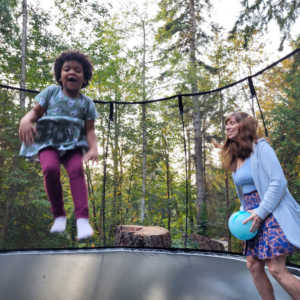 I love having fun and being silly with my children. When I am spending time with my kids, I love to make them smile. My little girl has the sweetest dimples when she smiles and I love to see them. My son can be so silly and full of life and energy and it brings me joy. Many adults my age don’t like going to birthday parties, but I love them because it’s great to see happy kids having a good time and being silly.
I love having fun and being silly with my children. When I am spending time with my kids, I love to make them smile. My little girl has the sweetest dimples when she smiles and I love to see them. My son can be so silly and full of life and energy and it brings me joy. Many adults my age don’t like going to birthday parties, but I love them because it’s great to see happy kids having a good time and being silly.
If money and time were not a barrier, what is the one thing you would love to do to help Pamoza’s work in Malawi?
If resources were not a barrier, I would love to see the community health approach expanded in Pamoza’s area – speaking with people to understand their health needs, doing health check-ins, making sure everyone who wants and needs vaccines has them, getting full check-ups including vision and dental, enhancing nutrition, and just overall making sure all health needs are attended to which includes ensuring health workers in Malawi have all the resources they need to care for community members. I would also love to see long-term solutions for healthy water systems, green energy, sustainable agriculture, and good crops year over year. I would also love to ensure that all land rights and protections for family land are in place. Land is such an asset and I have seen what has happened in other countries and communities where land is taken away from people. I would hate to see that in Malawi.
Meet Thomas Zgambo
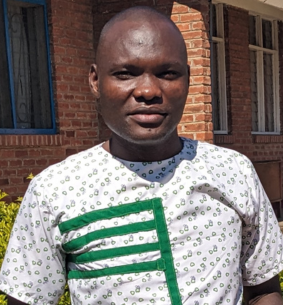 Thomas is our Community Outreach Monitoring and Evaluation Officer (COMEO) in Malawi. He was born and raised in Zowe, where Pamoza started its operations, and was one of our first scholarship recipients. He excelled in all his academics and went on to earn his master’s degree from the Minnesota Graduate School of Theology, where he majored in Leadership and Organizational Management.
Thomas is our Community Outreach Monitoring and Evaluation Officer (COMEO) in Malawi. He was born and raised in Zowe, where Pamoza started its operations, and was one of our first scholarship recipients. He excelled in all his academics and went on to earn his master’s degree from the Minnesota Graduate School of Theology, where he majored in Leadership and Organizational Management.
As the COMEO, Thomas has innovated how we reach families by bringing together our program experts to work with clusters of households that form learning communities. It has been an extremely effective way to help families get trained together and to encourage them to train others.
Tell us a little about yourself, your background, your family, and your interests.
I am 33 and the first-born in my family of 4 children. My father passed away in 2012. I went to Lilongwe University of Agriculture and Natural Resources and got a BS in Agriculture (I majored in Agricultural Engineering). I went further to earn my master’s degree at Minnesota Graduate School of Theology, where I majored in Divinity (Leadership and Organizational Management).
My main interests are reading books (both spiritual and positive life-transformation books), teaching, preaching, and making friends. I have read the whole Bible and I intend to continue to read it so that I should not perish and also not lead others astray because of lack of knowledge.
What is your role at Pamoza?
I work as a Community Outreach Monitoring and Evaluation Officer. In this role, I focus on reaching out to the community about the C.H.I.E.F initiative trainings and monitoring the implementation of the lessons learned. The objective is to see vulnerable households get transformed with the knowledge that we share with them. I also monitor and evaluate all Pamoza programs to assess our impact against the vision, mission, and objectives of Pamoza.
Why did you move back to the village and get involved with Pamoza’s work instead of staying in the city after college?
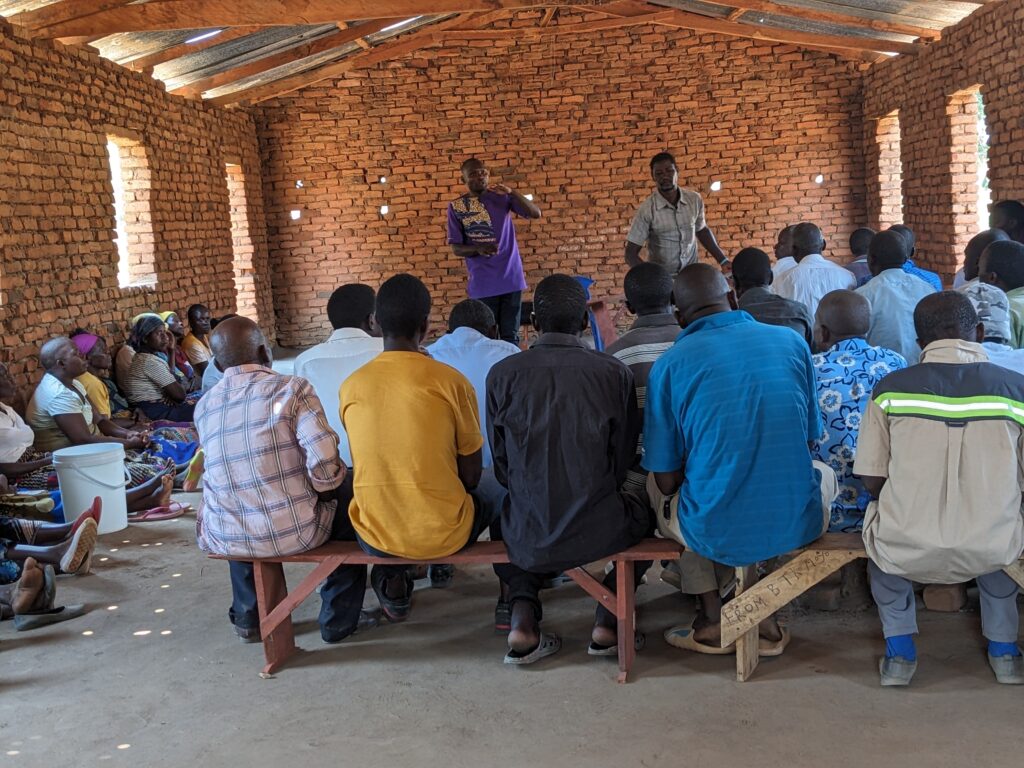
In Malawi, there is a belief that once you finish college, you are supposed to work in the cities because that’s where lucrative jobs are, but this belief can hinder God’s direction in your life. I decided to be flexible, and this enabled me to understand God’s assignment upon my life: to serve him for Him back in my home village. The Bible says that it’s difficult to be taken seriously in one’s own village. But with the help of God, I can excel in the purpose He has for me.
Also, Pamoza’s work seemed to intersect with the assignment of God upon my life, so I see serving the people of Zowe and the surrounding communities as a good platform for the expression of God’s gifts in me. For the fulfillment of life is not in the possession of gifts but in the expression of the gifts for the benefit of many. And it is good for people in my own village to benefit from what is within me.
What is one of the greatest needs you see in the communities Pamoza serves, and what do you think is the best solution?
Apart from the material things that people need, of which there are many, communities often lack understanding of how to utilize the resources available. For us to be successful in community development, we need to invest in building knowledge and capacity, which should be accompanied with the material provision for the sustainability of the programs we’re implementing.
How does having a relationship with God make a difference in your life?
There is prevalence of peace in my heart that enables me to be focused in life. In addition to that, God is light, and being connected to Him means His light will be reflected in me as well. My relationship with God also helps me notice people’s strengths more than their weaknesses. This has helped me to have positive interactions with everyone in the community. The strength of others overcomes our weaknesses.
How can we pray for you?
Pray for God’s wisdom to be with me always as we are reaching out to many people.
Meet Daniel Ho
 Daniel is a high school junior who recently traveled to Malawi on a missions trip. After serving in Malawi, he reached out to Pamoza to see how he could continue to help and is now one of our interns! We caught up with Daniel to find out more about why he is passionate about what he does.
Daniel is a high school junior who recently traveled to Malawi on a missions trip. After serving in Malawi, he reached out to Pamoza to see how he could continue to help and is now one of our interns! We caught up with Daniel to find out more about why he is passionate about what he does.
Tell us a little about yourself.
I’m in 11th grade and go to Delaware County Christian School. For fun, I like to play tennis, oboe, and am teaching myself the guitar. My parents are both in the healthcare field (dad’s a doctor, mom’s a nurse) and my grandparents on both sides are from Hong Kong.
You traveled to Malawi for the first time this year. What made you decide to go?
I’ve always wanted to learn from and experience a new culture, and going with members of my church to Zowe seemed like the perfect opportunity to both serve and learn from new people.
How was your experience on the mission trip? What will you remember most?
 I had a great experience on the mission trip! The ride there and back was a little painful but fun with us all bouncing on the bumpy roads. I really enjoyed working with the facilitators there to teach them film, and playing with the kids was probably my highlight of each day. Ultimately, though, I think I’ll most remember hiking to the top of Kayowoza Mountain to watch the sunrise.
I had a great experience on the mission trip! The ride there and back was a little painful but fun with us all bouncing on the bumpy roads. I really enjoyed working with the facilitators there to teach them film, and playing with the kids was probably my highlight of each day. Ultimately, though, I think I’ll most remember hiking to the top of Kayowoza Mountain to watch the sunrise.
Tell us a little about how you will be partnering with Pamoza as a result of the mission trip?
I’ll be a Videography Intern, so I’ll be focusing on gathering footage to promote Pamoza programs and events. I’ll also be working on organizing the footage taken by facilitators in Zowe, editing videos to post on the Pamoza YouTube channel, and growing Pamoza’s YouTube audience.
What impact did the mission trip have on you as a student?
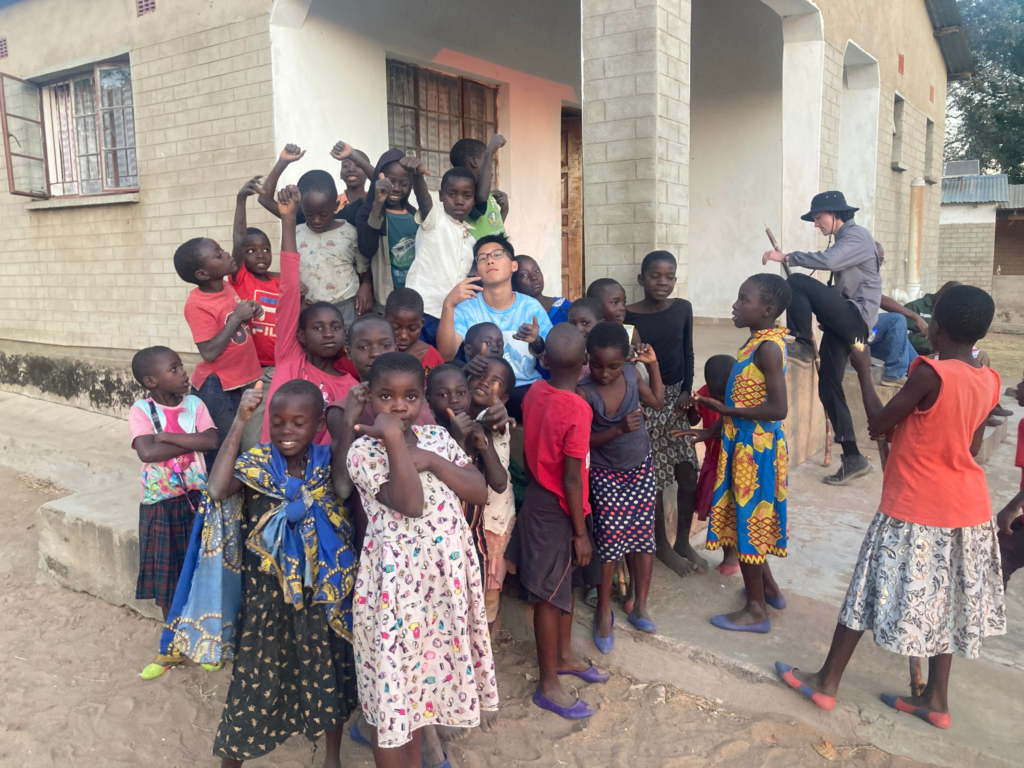
As a teenager who would worry often about what my future holds, I feel like my trip to Malawi totally changed my perspective and values on life. In Malawi, or at least Zowe (where we stayed), while there isn’t much material wealth, the people there seem to be overflowing with spiritual wealth when it comes to happiness and community. Seeing how much happier the people I met are compared to people back home in America made me begin to think about what is really important in life, and how I worry about things that may eventually be futile in the long run. This led me to a deeper reliance on God, because while I don’t know what I will do in my future, I do know a God who has plans for me, and what I can do in the daily is stay open and receptive to His wishes as He does with my life what He wishes and molds me into His likeness. (Isaiah 55:1-2)
What is one thing you like most about Pamoza and/or the people Pamoza serves in Malawi?
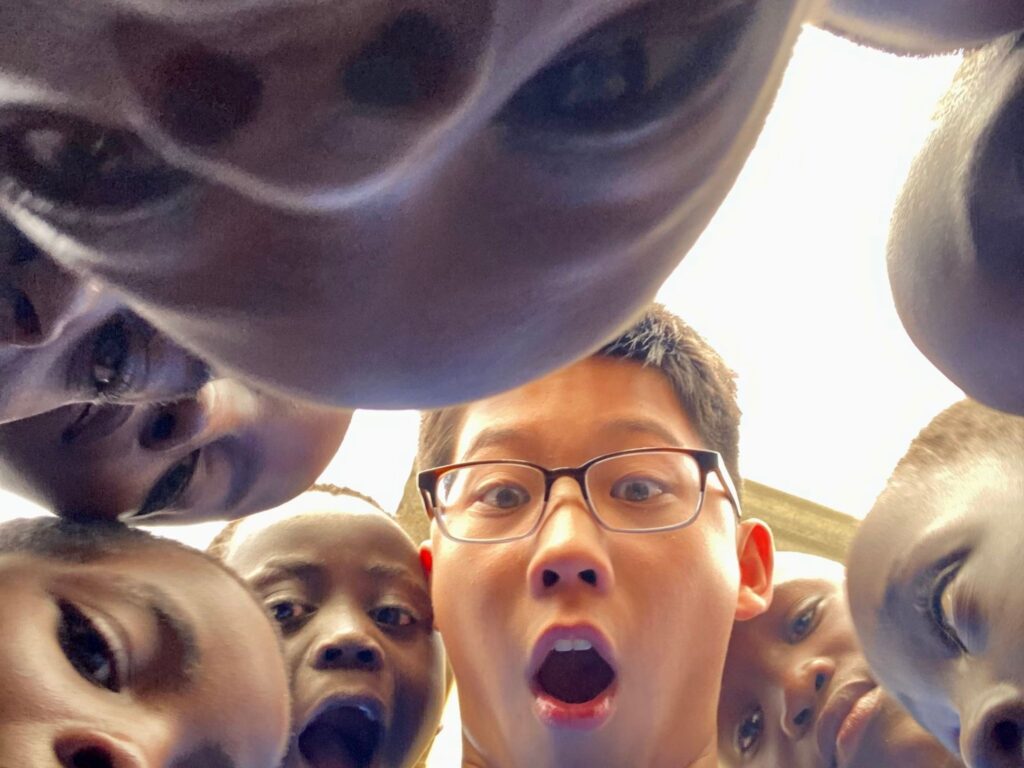 One thing I liked most about Pamoza is how dedicated the staff are to Pamoza’s cause. There seemed to be this prevalent joy in their work that seeped into everything they did, from their interactions with others to delight in servitude.
One thing I liked most about Pamoza is how dedicated the staff are to Pamoza’s cause. There seemed to be this prevalent joy in their work that seeped into everything they did, from their interactions with others to delight in servitude.
What unique skills or talents has God gifted you with that you would like to use to help others?
I don’t think I would call it a unique skill, but God has given me a curiosity and desire to learn new things, and a love of teaching. Once I learn a new skill (such as video editing), it gives me great joy to try and share with someone else what I learned. Through this, He has led me to serve Him in different ways, such as managing the audio-visual at church, helping with Pamoza, and playing music in worship.
Meet Carol Austin
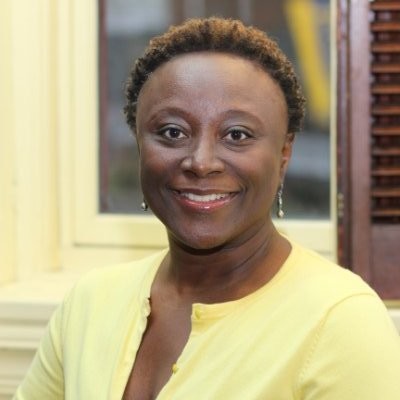
Carol Austin is a Pamoza board member and also the Executive Director of First Up, a non-profit organization focused on early education. She has served on Pamoza’s board since 2015, making her one of our longest standing board members. Find out what makes Carol so unique.
What is one interesting fact about you?
I love to travel and have traveled to 42 countries so far. I have a goal to visit every state in the U.S. and have already visited 35 states.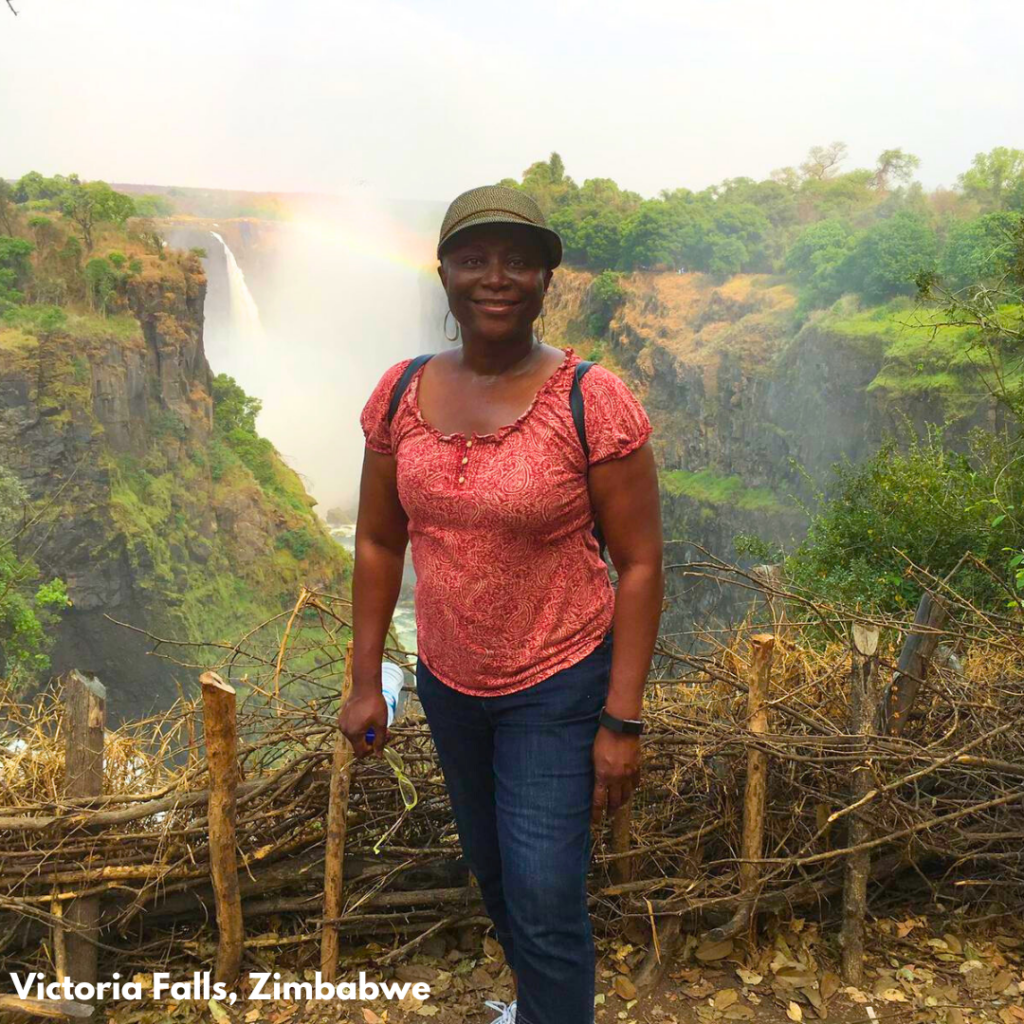
Why did you join Pamoza’s Board of Directors?
I joined the board of directors because I was so impressed by the structure, the programming and the fact that Pamoza International was really about creating a sustainable partnership with people in Malawi, particularly in Zowe and surrounding communities. This equal partnership involves people doing the ground work in Malawi and Pamoza providing guidance, direction, and funding. There are many needs and so much good that we do to alleviate those needs. It costs so little but makes such a profound difference. The sheer number of programs we have that focus on literacy, entrepreneurship, scholarships, school breakfast, and agriculture are all part of the organization’s wholistic transformation strategy.
What has been the most meaningful activity you have participated in as a board member or Pamoza supporter and why was it meaningful?
I love the events when we share food and cultural aspects of Malawi right here in the U.S. I love these events because they connect people and it’s a way to travel to Malawi without traveling there. We tell a lot of stories which are incredibly powerful and create a meaningful connection with funders or potential funders to the people in Malawi.
What is one thing most people don’t know about Pamoza?
Most people don’t know that the amount of work that gets done, and the difference that is made, is by very few people. The team in the U.S. is very small, less than 3 people. There is a lot that gets done on a shoestring budget and we need more people to help make the kind of difference that we want to make.
Why should people support Pamoza when there are so many other causes to support?
Pamoza is about more than just “giving people fish.” It’s about teaching people how to fish. It’s about changing and transforming lives. If you want to see very practically a whole community transform and you’re committed to community transformation, this is definitely an organization worth supporting.
Also, we really need your support, especially financial support, to be able to take our work to the next level.
Meet Ian O’Connor

Ian O’Connor is an emerging project developer and manager in solar and renewable energy. He is passionate about the work he does and he loves connecting with new people. We caught up with Ian to find out more about why he does what he does. Here’s what he had to say.
How did you get involved with Pamoza?
In 2013, I had the opportunity to go on a missions trip to Malawi with a group from Springton Lake Presbyterian Church. I was still in high school, and it left a remarkable impression on me. This trip shaped my character and contributed towards my desire to work and study in the fields of renewable energy and international development.
What do you remember most about your visit to Malawi?
During our missions trip, we facilitated a camp for 900 students at 3 different schools, hosted a medical clinic, donated medicine and supplies, and visited with the community members. What I remember most strongly was how integrated the community was, and how community-oriented the people were. I will never forget everyone’s extreme kindness and welcoming energy. The people of Malawi were incredibly engaged and were more than willing to share their time and stories with us. I was left feeling inspired by the way the communities we visited were so connected and lively. 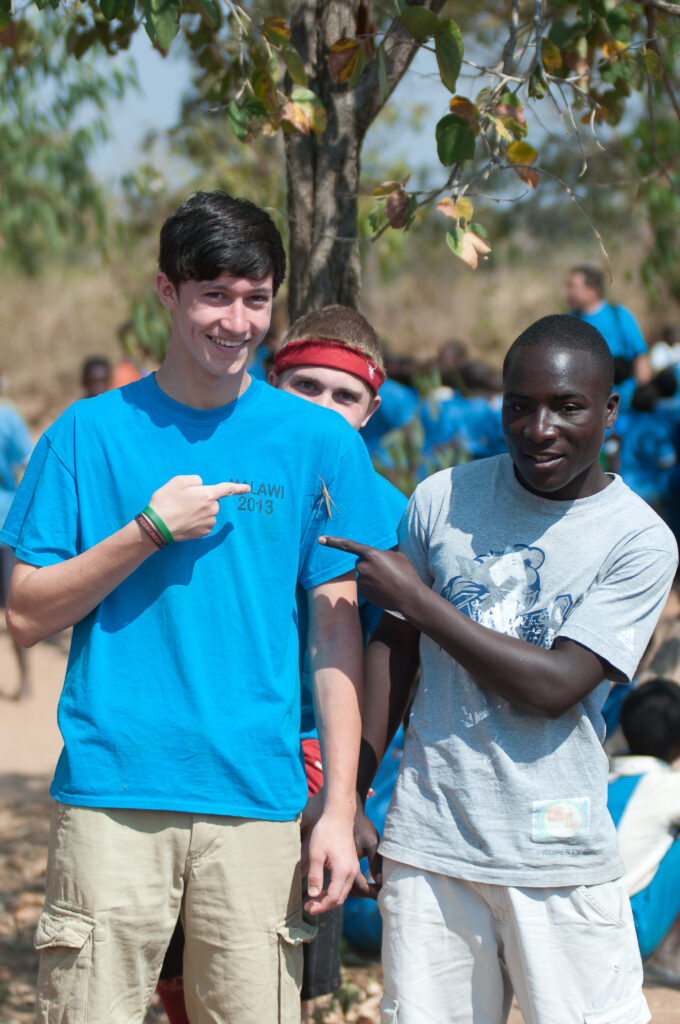
What project are you currently working on with Pamoza? What is difficult about this project? What is exciting?
I am currently working on expanding solar power for Pamoza’s Vocational Skills Development, Training, and Counseling Center. This will be part of a multi-year journey to establish and expand a campus across from their 70-acre farming institute. Pamoza will be creating curricula and training focused on different trades, including tailoring, solar energy installation, carpentry, bricklaying, and irrigation for the farming institute. Pamoza is also planning to provide other resources at this campus such as a library, computer lab, and counseling center. All of these initiatives will be powered by solar energy.
The biggest difficulty is that developing off-grid solar power is very different from my previous experiences in the US, which all connected into the electrical lines that we use to power our homes. When you are developing off-grid systems, factors such as batteries, system resilience, and maintenance efforts are crucial. The most exciting part is knowing that these energy systems are will open up doors for people! This will empower people to learn a new trade, which creates economic opportunity for them.
What made you pick your current project for Pamoza?
In the last year of studying renewable energy at Villanova University, I had many conversations with Pamoza’s Executive Director about which buildings in the Zowe community could benefit the most from solar installations. We chose this project as an effort to benefit the largest number of community members. The system will provide returns for the people of the area for years beyond their attendance at the vocational schools. That is what inspired the choice.
You have been involved with Pamoza since a young age, what keeps you engaged?
With all the various initiatives that Pamoza provides, I genuinely could not think of a more impactful non-profit organization. Through Christian outreach, healthcare, education, agriculture and food security, and economic empowerment programs, Pamoza is absolutely changing lives within the communities it serves.
Meet Leah Hood
Leah Hood is a Pamoza Board member and the chair of our Fundraising Committee. She is
passionate, committed, and not shy when it comes to spreading awareness about Pamoza. We caught
up with Leah to find out more about why she does what she does. Here’s what she had to say.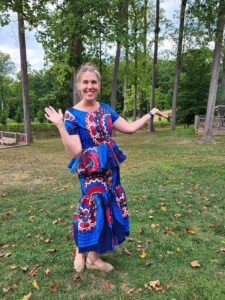
What is your current involvement with Pamoza and what do you enjoy most about it?
I serve on the board as the chair of the fundraising committee. I love meeting people
who love Pamoza. There is a large and inspiring community of people who are
committed to the work we do, but more importantly our supporters are committed to
seeing the people of Zowe thrive. I also love staying connected to international work. It can be tempting to limit our focus to what is in front of us. COVID forced us all to become very local. There is a beauty in that, but I love being reminded that the world is a very big place. Pamoza helps me expand my vision and be connected to people on the other side of the globe.
You recently traveled to Malawi for the first time. Tell us about what struck you most during your time there?
I was really struck by the commitment of the field staff to building relationships with
people. Pamoza is very sensitive to the realities of life in rural Malawi. Our work is
organized around making sure each model in all of our program areas can be replicated
by the local people we serve. It might be faster to come in and do it “for” people… but
when you do things “with” people, that is when the true power of pamoza comes to life.
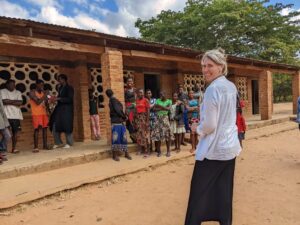
What is your favorite Pamoza program and why?
How can I pick a favorite? I love them all! That was the best part of being in Malawi —
getting a chance to see all our programs up close. The school breakfast programs,
demonstration garden, sewing classes, and pastors’ training were all very inspiring!
Is there anything new you have learned about yourself through your volunteer work with Pamoza?
I was reminded of how much I enjoy experiencing things first-hand. I’ve been connected
to Pamoza for many years, but I feel a renewed sense of commitment and energy since
my trip to Malawi this summer.
What are some easy ways for people to get involved?
I think the easiest way to get involved is to think of something you are personally
interested in and find the connection to Pamoza. Is it education, or girls’ empowerment,
or sustainable agriculture, or business, or ministry? Because of Pamoza’s holistic focus,
there is likely something that we do that aligns to your passion. I love gathering people
together, so another board member and I are co-hosting a garden party this fall to
celebrate Pamoza. We look forward to gathering our friends to invite people to be a
part of what is happening in rural Malawi.
Meet Tionge Chile
Tionge Chile, our Program Coordinator for Education, Literacy and Vocational Skills has revolutionalized how we support students, their families, and the communities we serve.
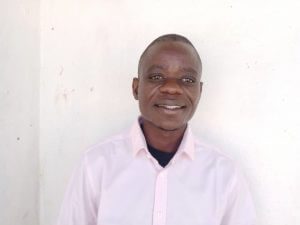
“I hope to see a self-reliant and sustainable Malawi— a community where all children happily go to school, a country full of graduate and skilled people who can fully impact their families with compassion and love.”
Read the following interview with Tionge to find out what drives him to do the work he does.
Describe the work you do for Pamoza
As the program Coordinator for Education, Literacy and Vocational Skills, I facilitate the implementation of all our education activities. We have five major education projects:
- scholarships and family empowerment
- adult and functional literacy
- school breakfast program
- child protection and social accountability
- skills development and vocational training
- For scholarships and family empowerment, we provide tuition support to hardworking, well behaved, God fearing, and high school or college students who are unable to afford school fees. We also provide agribusiness support to their families such as improved seed or fertilizer so they can grow food they can sell. This project has helped to transform many families. I have noticed that after two years of agricultural support, many families that were previously unable to support themselves are now able to do so.
- The adult and functional literacy program focuses on reducing illiteracy level in the community. Adult learners are equipped with reading, writing, and computation knowledge and also learn agribusiness skills, home economics, and Christian family management. All these skills are helping transform the lives of people in our communities.
- The school breakfast program focuses on providing nutritional food to children in primary school in order to reduce malnutrition. This encourages children to attend school, thereby lowering the school dropout rate, which has reduced child marriages, substance abuse, and illiteracy.
- Child protection and social accountability activities focus on educating children about their human rights and where they can report abuse through clubs like Pamoza Girls Rise and Pamoza Boys Champion. The program focuses on protecting children’s rights by facilitating awareness and sensitization in communities and forming local dialogue structures like Chief Caucus (CC), Community Activists (CA) and Start Awareness & Support Action- Women. (SASA Women)
- Skills development and vocational training aims to equip communities with technical skills and empower trainees for entrepreneurship and employment opportunities. It also provides farm inputs to trainees so that the harvest can be sold and used to pay training fees and purchase equipment for themselves. Since skills are highly sustainable assets for development, this is one of the most transformational projects for people in rural communities.
Why did you join Pamoza?
I was inspired by Pamoza’s mission, vision, and its commitment to helping vulnerable people. When I joined, I was moved by the organization’s approach and Christian commitment. The uniqueness of Pamoza’s C.H.I.E.F. initiative inspires and encourages me to work hard in pursuing my calling every day!
The communities we serve and their vulnerability is another confirmation of my call to service. Although my previous employment was more lucrative, I was not as personally satisfied by the work as I am with Pamoza.
What do you love about your job? What do you find challenging?
I love seeing young people get the required support to facilitate their education, realize their dreams, and impact their community. l like the School Breakfast Program because it not only addresses severe hunger and poverty in communities, but also reduces school dropout rates and child marriages.
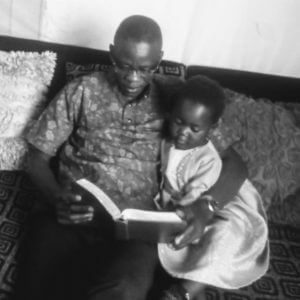
I think the Scholarship Program and School Breakfast Program are the very best programs in helping young people transform their lives and families with education.
I have been especially challenged with the Child Protection and Social Accountability project, particularly that of liberating people from the hold of traditional Ngoni cultural beliefs that encourage child marriages, gender-based violence, male dominance, witchcraft practices, school dropouts, and substance abuse. Through our community programs we have developed and trained community members to bring resilience and change their mindset.
What are your hopes and dreams for the people in rural Malawi?
I hope that Pamoza’s mission is achieved and that the C.H.I.E.F. strategy is embraced by all communities. I hope to see a self-reliant and sustainable Malawi — a community where all children happily go to school, a country full of graduate and skilled people who can fully impact their families with compassion and love. In short, I want to see a saved nation of people filled with the holy spirit who are committed to serve and develop their own nation!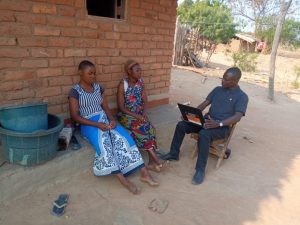
What is one educational impact story that really sticks out to you?
The story of Linda Nkhata, a widow and chronically ill mother of four children. Because of poverty, she fled to South Africa for greener pastures so that she can support her children’s education. Due to her health condition, Linda couldn’t cope with the tough situation in South Africa and returned home.
When she came to Pamoza International asking for tailoring training at the Skills Development Center, we saw her passion and the challenging situation she was in, so we assigned Wongani Chibaka to train her and also provided a scholarship to her daughter Eveles Mapala based on her school performance and good behavior. Eveles is still at Euthini secondary school, and this year she has even received a government scholarship! Today with the technical skills she got through the Skills Center, Linda is running her own tailoring shop and employed other women to help her run the shop. She is now able to support her other children’s education on her own and the rest of her family with all basic needs.
I consider Linda as one of the hardworking women who have managed to challenge poverty despite being a widow and having a chronic illness. The commitment and hardworking spirit of Linda encourages me to work toward Pamoza’s ongoing mission to transform our communities and how best we can facilitate this. Today she is a model to single mothers and all people living with HIV in her community— a true testimony for the hopeless! Linda and her daughter Eveles are extremely grateful to Pamoza International.
How can we pray for you?
Please pray for:
- Continued mutual family relationships, faithfulness, love, fellowship, and spiritual growth.
- Career development—I am planning to do a Master’s of Science in Transformative Community Development with Mzuzu University, which will help to enrich my knowledge and skills in service delivery.
- To be continually inspired in the delivery of services with compassion and commitment, to have an impact with lasting solutions, and to meet the needs of the communities we serve.
Meet Melissa Nyoni
Melissa Nyoni has been with Pamoza since the very beginning, way before we even became an official non-profit organization.
Melissa is thoughtful, diligent, and committed to the work that we do in Malawi. She is Pamoza’s co-founder, first Executive Director, current Board Chair, and “honorary Malawian.”
Those of you who have supported Pamoza for a long time might already know her story, but many of you do not. So we took a moment to interview Melissa so we can all learn more about who she is and how she became involved with Pamoza.
When you were just 21 years old, you decided to leave the U.S. and live in Malawi. What led you to that decision?
When I was in college in 2003, I took a class called “Poverty, Oppression and Development in Africa.” It was taught by Dr. Mike Mtika. This class involved a two-week trip to Malawi. During that time we got to spend three days staying overnight with a family in Zowe. We conducted interviews and learned about the people and the culture. I absolutely loved the experience.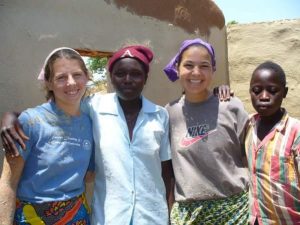
I was an anthropology major and I felt like I was finally getting to put some of that into practice. I got excited about what I saw in the community and the potential I saw in people and the difference we could make working together to help meet some of the needs that the people of Malawi were facing.
Out of that class I decided that I would go back to Malawi for a year to start implementing some of these projects. And so I did that in the summer of 2005 along with two other Eastern graduates, Christy and Bethany. During that time we helped build a clinic, ran some bible studies, taught in the schools, and got some of the projects started that we were working on in the class. So for me, one year turned to three years and it was just an amazing experience getting the work of Pamoza started before Pamoza even existed.
What was it like staying in rural Malawi those three years you were there?
It was definitely a cultural shock at first. It was very different than living in the US. When we first moved there we lived in a teacher’s house, which was really just a mud hut with a grass-thatched roof. We were also building a brick house that would have 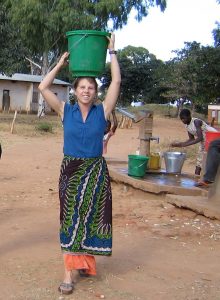 some solar lights, but it was definitely a very different experience. We had to carry our own water, cook over the fire, and do so many things that we never thought about doing on our own with no running water, no plumbing and no way of doing things the way we often do them in America.
some solar lights, but it was definitely a very different experience. We had to carry our own water, cook over the fire, and do so many things that we never thought about doing on our own with no running water, no plumbing and no way of doing things the way we often do them in America.
It was a big learning curve and a challenge in a lot of ways, but it was also very fun and exciting. We made really great relationships with some of the people. Since we lived really close to the school, we got to to interact with the school children a lot. It was such a blessing. They would come to our house where we had lots of library books and they would check out some of the books. We learned to speak Tumbuka by trying to talk and engage with them and that was a really fun experience.
What were your fondest memories?
One of my fondest memories of my time in Malawi in those first three years was starting the breakfast program and working with the women involved in that committee. When we started the School Breakfast Program, the goal was to provide breakfast for the children at Zowe Primary School every day. Many of the students were coming to school having not eaten anything and wouldn’t eat until later in the day and the situation was even worse during “the hungry season” when many families started running out of their harvest.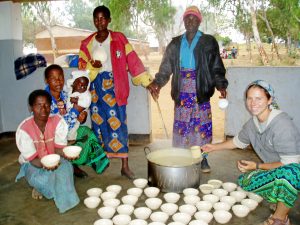
So we decided to make a very nutritious porridge to help support the children. But we also wanted to do it in a way that engaged people in leadership in the community and allowed the community to take ownership of it. And so when we first started the program, I got to work with a committee of fifteen women, one from each village. They led teams of volunteers for their village to prepare the porridge, and planned and put together the program. It was a really amazing experience getting to know these women and work with them. I saw them take on leadership roles in their community to make a difference for their own children. That was definitely one of the best experiences of working in Malawi at that time.
Can you tell us a little about your involvement with Pamoza International since the time you returned from Malawi? What various roles have you played at Pamoza?
Since returning from Malawi, I have been involved with Pamoza International in a variety of ways. When we first worked in Malawi we were with Eastern University and then with an organization called Giving Heart Ministries. The work was underway in the community, but Pamoza International did not exist until 2011. The work Pamoza was doing was already underway in the community but the actual organization was founded in 2011. Dr. Mike Mtika and I worked together, with a lot of help and an amazing team of volunteers, to get Pamoza officially incorporated and established as a 501(C)3.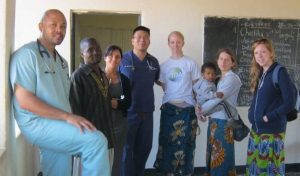
During the first year and a half, I served as the Executive Director to help us get started and off the ground. I then realized that as much as I love the work of Pamoza, my gifts were better suited in other places. And so I happily gave the responsibilities of Executive Director to Temwa who has grown Pamoza in leaps and bounds since and it has been exciting to watch. I have continued to serve on the board in different capacities, providing perspective and guidance. I served as the Board Secretary and I now serve as the Board Chair. It has been exciting to be a part of Pamoza’s growth over the years and to see how things have amazingly changed and transformed the lives of people in the communities we serve, and in our own lives as well.
How do you see Pamoza now? What are your hopes and dreams for the organization? What are you most proud of?
Pamoza is now doing absolutely amazing things; things I never could have dreamed possible all those years ago in 2004 when I first stepped foot in Malawi. It’s incredible to see how a group of people, when they are filled with the love of Christ and committed to seeing real transformation happen, can make amazing things come about in their communities. So it’s exciting to see where Pamoza has expanded from just a few projects in one small community to working in over 20 different communities impacting so many lives on so many levels.
My hope and dream for Pamoza as an organization is that it continues to grow and impact lives, and it continues to do that by working together with the people in the U.S. and those being served in Malawi. One of the amazing things about Pamoza is that it empowers people to improve their own lives and make a difference in their communities. It has been exciting to see how that pamoza mindset, not just the work of Pamoza, is helping people to become catalysts for change in their families, in their villages, and in the larger community setting. My hope is that the mission of Pamoza will continue to expand to new places and impact more lives. I know that God has more in store for Pamoza and I can’t wait to see how that unfolds.
Meet Fanny Nkhonje
Fanny Nkhonje is our bookkeeper in Malawi. We are blessed to have Fanny on our staff, but we knew her long before she started working for us. “I became a born-again Christian through Pamoza. The Word of God was preached in my village and I was moved. I surrendered my life to Christ.”

We caught up with Fanny to learn more about her journey and experience working for Pamoza International. Fanny is one of our hardest workers. She does not shy away from challenging tasks and always seeks to enhance her knowledge for her role. This year, Fanny, who is one of three women on our staff, received the Employee of the Year Award. It was well earned and we couldn’t be more proud of her.
What do you like about working at Pamoza International?
What I like about Pamoza is that the organization is about transforming the lives of children and families and I find that to be the most important thing in one’s life. Also, Pamoza addresses all areas of well-being like in our C.H.I.E.F. Program. That inspires me. Being a part of the organization, I am learning about how my life, and that of my family, can be transformed from one level to the next.
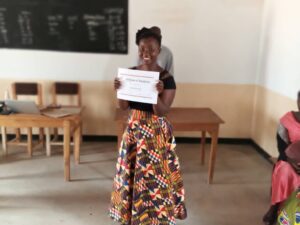
What is the hardest part about your job?
The hardest part about my job is that it is very demanding and requires me to work during and after office hours. I some
times work on weekends especially when there are payments to be processed. I have to prepare the vouchers, get them signed, move from one bank to the other, etc.
What is your favorite Pamoza program and why?
My favorite program is agriculture. I love farming and the agriculture program at Pamoza is close to my heart. It shows me that one can really be changed through proper agricultural practices, especially here in rural Malawi.
How has your life changed because of Pamoza?
My life has changed in many areas through Pamoza, especially in my spiritual life. I became a born-again Christian because of Pamoza. Someone from Pamoza came to my village and preached the word of God. It moved me and I surrendered my life to Christ and made him Lord of my life.
How can we pray for you?
Please pray for God to always grant me more grace in life. I believe that every good thing I have in my life is there by the grace of God and this includes my workplace, my family, etc. I would like for God’s grace to continually flow in my life.
Meet Karissa and Brandon Forino
Meet two of our most committed volunteers: Brandon & Karissa. We were so excited when they got married in 2019! We knew that together, they would be a great force for change. This couple volunteers for Pamoza in so many ways – helping us enhance our finan
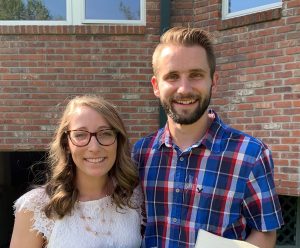
cial processes, supporting our mission team, participating in our 5K, traveling to Malawi, and building corporate sponsors! So we asked them some questions to find out why they do what they do for others.
You have been involved with Pamoza for some time now. What keeps you involved?
We love Pamoza! From the mission to the staff, every part of Pamoza makes us feel welcome to give our time and serve. Pamoza’s dedication to sustainable, Christ-centered community development is at the core of our love for this organization. I (Karissa) saw this firsthand when I studied abroad in Malawi with Dr. Mtika, and serving with Pamoza has been very close to my heart ever since. Our relationships with staff and other volunteers over the past few years have made Pamoza feel like family, and has continued to grow our love for the work they do.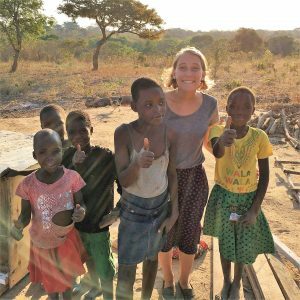
One of the things you decided to do after graduating from college was to support Pamoza with a monthly donation. What made you decide to donate every month instead of once in a while?
Giving consistently was something we knew we wanted to prioritize both as new graduates and as newlyweds. Our hearts are deeply connected to Pamoza and we knew giving monthly would not only have the greatest impact, but also was a way to faithfully commit to supporting God’s work in Malawi.
What is one of your favorite memories volunteering with Pamoza?
One of our favorite experiences volunteering together for Pamoza was the Gala. The evening was such a testament to the wonderful work Pamoza does, and it highlighted the beautiful community of staff, volunteers and donors who all make this work possible.
 It was an honor to volunteer for the first ever Pamoza Gala, and not to mention it was a total blast!
It was an honor to volunteer for the first ever Pamoza Gala, and not to mention it was a total blast!
What do you think is something someone can easily do to help Pamoza and the people we serve in Malawi?
One of the easiest, but most impactful things someone could do for Pamoza is pray! Pray for the work, the staff, and the people they serve. If you already pray for Pamoza regularly, another easy way to support their work is by joining their recycling program. Donate empty ink cartridges, used cell phones, and aluminum cans which can be recycled for cash to fund Pamoza programs. Think broadly, you can find these items at your work, at home, or even at church!
